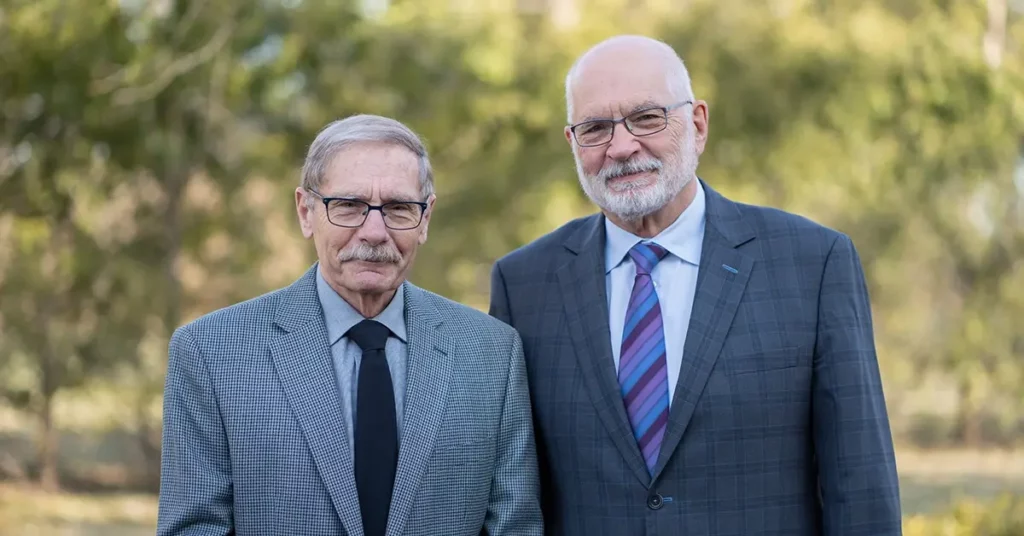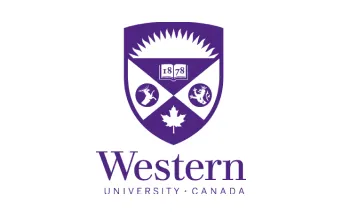Leading the Way: VHS Founders Awarded Honorary Degrees
June 6, 2024

Virtual High School (VHS) Principal Steve Baker and his long-time friend and colleague, John Smallwood, are set to receive honorary degrees from Western University. Awarded to individuals who have demonstrated outstanding achievement in the world of academics and exceptional service to their community, Western’s Doctor of Laws degree is well-deserved recognition of the work that Baker and Smallwood have done to make education accessible to thousands of students around the world.

As pioneers in online education in the mid-1990s, Baker and Smallwood recognized that a new way of delivering education was needed for students to reach their full potential. Together, they created the original asynchronous virtual experience to help students who needed more flexibility and support.
VHS has come a long way since those early days, expanding beyond anything the two educators could have ever imagined when they created their first biology and Canadian literature courses. We asked them to weigh in on the creativity, hard work, and challenges that have come along with the evolution of VHS.
Stephen Baker
What challenges have you faced as a leader in online education?
The greatest challenge was starting up. We needed courses for students to take, while at the same time, we needed students to help fund course development. Virtual High School did not have outside investment. I was teaching full time with the public school board, but I also wrote a dozen or so courses in the evenings and on weekends. We did not have a learning management system, so I simply wrote the whole course in HTML and posted it behind a password accessible site. The writing and developing of each course posed many problems needing to be solved and while this was challenging, it was very rewarding as well. Many nights I had to force myself to stop what I was working on and go to bed at 3 a.m.
How do you empower students to take control of their own learning?
Students are empowered to take control of their own learning in multiple ways. The school is set up to allow the students to begin at any time, move through the courses at their own pace, and write their final exams at any time. As they proceed through a course, each student decides when to submit their assignments according to their own schedule. Each student learns communication and self-advocacy skills when they have questions. It has always been an important aspect of VHS to place the student in control of their own learning and education.
Can you highlight your proudest moment as the founder and principal of Virtual High School and Virtual Elementary School?
Without doubt, it is seeing the staff of VHS become experts in the policies and procedures needed to operate a credit-granting school in Ontario. Becoming an inspected school that is authorized to issue OSSD credits is a complex undertaking. The school is regularly inspected by the Ontario Ministry of Education and the inspectors closely examine everything we do. We were told by a former inspector that our online school, in their opinion, was the “best in Ontario.” As the principal, knowing that my administrative staff are knowledgeable and experienced in administrative matters makes me proud.
The academic and multimedia teams at Virtual High School have also written and developed the equivalent of 75 textbooks, and Virtual Elementary School has written the equivalent of 50 textbooks. This was a HUGE undertaking. I am proud of these accomplishments and the fact that these courses are constantly being updated and improved as the teams work on making them more interactive and responsive to learning needs.
John Smallwood
What made you want to advocate for change in the education system?
Having been in the classroom for several decades before Steve and I began online teaching, I was looking for more innovative ways of interacting with students. I was also interested in having my Canadian literature course reach a wider audience, so I eagerly agreed to take part.
What has been the key to success in your long-term collaboration?
Steve has led the way with his creative insights into how online courses could be presented. He and others have looked after the development and management side of the business, creating courses that have met or exceeded the standards set by the Ontario Ministry of Education.
I’ve tried to introduce a set of protocols on how teaching might work in this new medium. With an emphasis on the attentive, detailed marking of assignments, I hope that I’ve had some influence in making the teaching as appealing as the courses are. Only by being supportive, prompt in the grading, having an emphasis on the attentive, detailed marking of assignments, and thorough understanding of the content, can teachers adequately serve the needs of students.
So, it’s a matter of my implementing what I hope is successful teaching, whereas Steve has led the way in the overall design of the courses and our business.
Do you have any advice for teachers who are just starting out in their careers?
The important thing to remember is that effective teachers are always learning—about their disciplines, about ways of making ideas accessible and enjoyable, about the ways in which students learn. When teachers stop learning, their students—the most important and most credible critics teachers can have—will realize that the teacher is simply going through the motions, and any enthusiasm the students might have had for the subject will likely soon diminish.